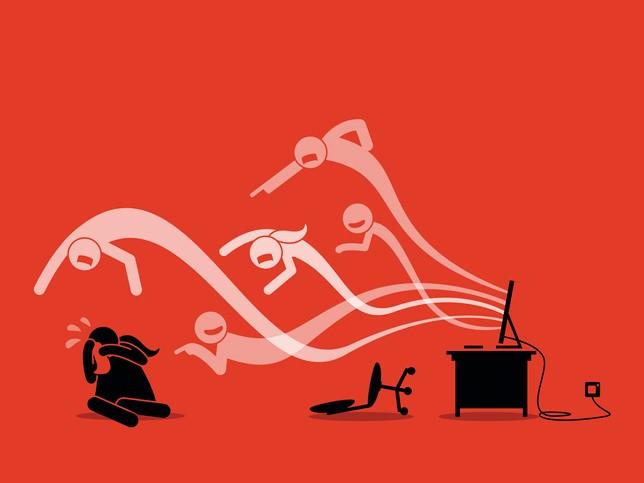
Collective voices, zero tolerance
Universities can use their ability to engage with students to effect cultural change, as the Bystander Intervention initiative to combat sexual abuse has shown. Louise Crowley explains how they did it
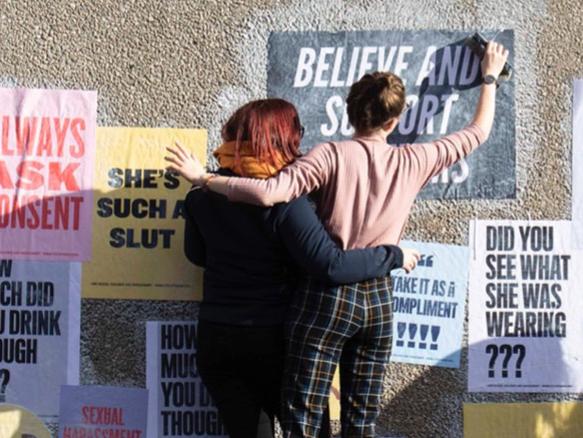
College life is challenging. It is difficult to speak up when faced with the uncomfortable behaviour of others, especially as a perceived lone objector. Using the university’s capacity to engage directly with its students, I developed the Bystander Intervention programme at University College Cork (UCC), modelled on the UK Intervention Initiative, as a way to educate and empower the student body to collectively demand a zero-tolerance approach to all forms of sexual harassment and abuse. Its aim is to effect cultural change.
Making an impact on understanding of sexual harassment
The impact data (below) demonstrate a significant and meaningful enhancement of participants’ understanding of what constitutes sexual harassment and violence, a realisation of their capacity to make a difference and the significant enhancement of their own ability to make effective interventions.
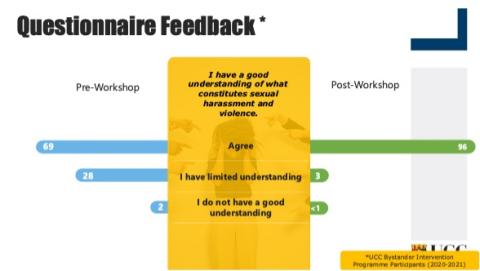
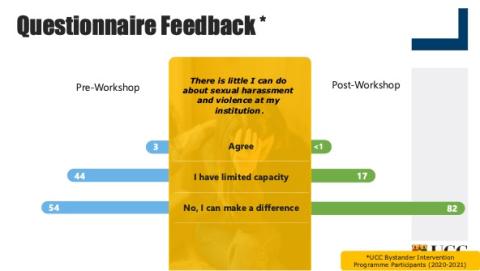
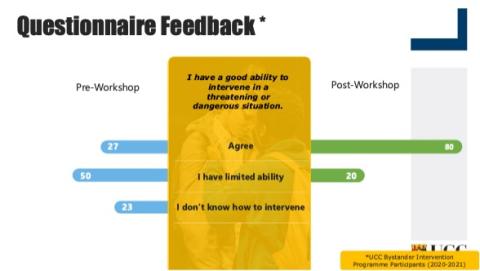
How did the Bystander Intervention programme begin?
The programme was piloted in 2016-17 as a compulsory module with academic credit for first-year law students, delivered by trained and supported UCC-based facilitators. The module was delivered over the course of six one-hour, in-person workshops, providing information and insights into what constitutes sexual assault and harassment and also, more broadly, engaging with issues such as personal assertiveness and social responsibility, encouraging participants to develop an understanding of the bystander role and their pro-social capacities to address and challenge unacceptable behaviour.
In 2017-18, this pilot was extended to first-year nursing and midwifery students, again on a credit-bearing basis. The module content was adapted from the Intervention Initiative Toolkit developed by Rachel Fenton, with funding from Public Health England. The extensive literature review of the theoretical rationale underpinning the original initiative was assessed at UCC and appropriate changes to the toolkit content were made to take account of the student experience in the Irish context. These modifications included adapting information and statistics to use the limited data from Ireland and Irish universities, and removing content that was less relevant to the Irish context; this also reduced delivery time.
Pre-pilot workshops were run with the officers of the UCC Students’ Union to capture the student response while also ensuring that the workshops accurately captured the challenges and issues arising within the Irish university context. The union actively endorsed and supported the programme and played a key role in validating the programme content from a student viewpoint. By developing a close and focused collaboration among student representatives, student support services and the academic community in UCC, it was envisaged that ultimately the module would be a catalyst for greater education and understanding across the campus, facilitating crucial learning and triggering conversations to influence behavioural change among the student community in a tangible and meaningful way.
Crucially, the UCC Student Health and Student Counselling and Development services were consulted, given the likelihood of increased disclosures during and after the delivery of the module, and enhanced counselling services were made available by the university.
Piloting the programme
For both years of the pilot, students who did not complete the requisite number of workshops were not eligible to progress to their second year of studies. Such was the value placed on the programme that it was also agreed that progression to second year of studies was dependent on the student passing the module, irrespective of their other academic marks. The student buy-in of the training negated the risk this approach posed; for example, in year one of the pilot, although seven students from a cohort of 163 did not pass the module at first attempt, repeat workshops were provided and ultimately all students successfully proceeded to their second year of their studies.
In follow-up focus groups, students who completed the module appealed strongly for it to be made available across the campus, so every student would have the opportunity to participate in the workshops.
Bystander Intervention is offered in blended format
In January 2019, the UCC Bystander Intervention training was relaunched as a blended-learning, predominantly online cross-campus programme, available to all UCC staff and students. Delivered over six workshops, participants learn about bystander theory, intervention inhibition and their capacity to recognise problematic behaviour. In the final in-person workshop, participants consider fictional scenarios, providing them with a safe environment to practise being active bystanders. It allows them to verbalise reactions that too often are silent and understand the significance of a safe and timely intervention.
The Bystander Intervention blended-learning module was launched at a dedicated conference on 28 January 2019 by then minister for higher education, Mary Mitchell O’Connor, during the inaugural Bystander Intervention week at UCC, which highlighted the need for the rejection of all forms of abuse and the power of a collective, informed student response that stands together to call out sexual violence and harassment and all forms of abusive comments and behaviour. The programme message was made very clear: through evidence-based education, together with intervention skills, we can help students effect change across the campus and collectively demand zero tolerance of all forms of abuse. The launch was followed by the posting of the ESHTE It Stops Now mural (below) on the main campus wall on the western side of the University Boole library.
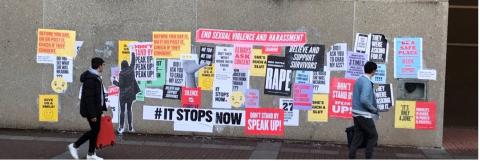
On completion of the training and submission of a personal reflection, participants secure a UCC Bystander intervention digital badge, demonstrating the significance the university attaches to the programme. The disciplinary breadth of participants provides a rich range of submissions, including .
In September 2020, UCC launched a for incoming students and made it available to all Irish higher education institutions to adopt free on their own virtual learning environment, making it accessible to more than 250,000 third-level students and staff.
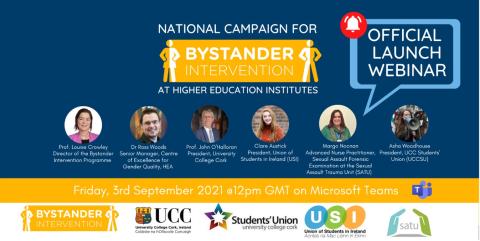
The Bystander Intervention programme enables the development of a visible institutional culture of positivity and support. By developing a collaboration across the campus community, it provides the catalyst for crucial learning, ally-ship and empowerment, and influences behavioural change among staff and students, as evidenced by participant testimonials (below).
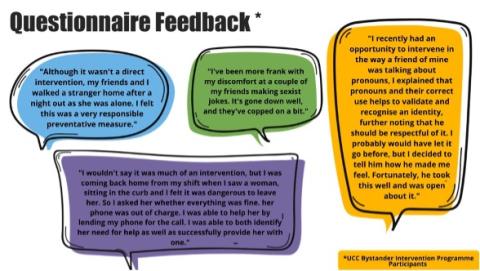
In 2022, I developed a second-level pilot programme with IRC funding, training 140 teachers to deliver it to 15- and 16-year-old students in 45 schools nationwide. This will empower and equip the next generation, with the skills to demand a zero-tolerance approach to all forms of sexual harassment and abuse.
Louise Crowley is a professor in the School of Law and director of the UCC Bystander Intervention programme at University College Cork.
She has been shortlisted for Outstanding Support for Students in the ����VR��Ƶ Awards 2022. A full list of shortlisted candidates can be .
If you would like advice and insight from academics and university staff delivered direct to your inbox each week, .
Additional Links
The programme has captured the imagination of Irish national media:
(from 8 minutes)
